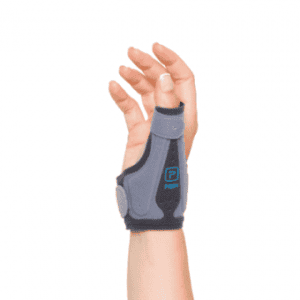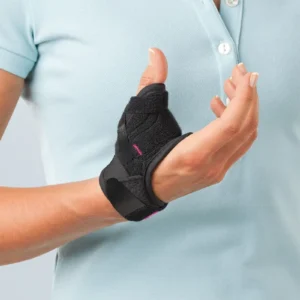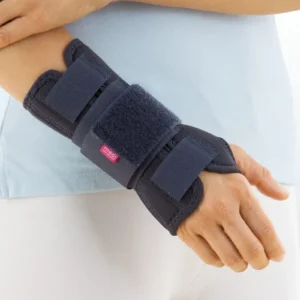De Quervain's tenosynovitis
De Quervain's Tenosynovitis cis characterised by inflammation of the tendons that pass through a tunnel in the wrist area, near the base of the thumb, with pain associated with movements of these tendons. This pain can be caused by pressure on the side of the thumb near the wrist and by forcing the thumb open against resistance.
Most common pathologies
on the Hand and Wrist
Symptoms
Pain and/or swelling at the base of the thumb; Difficulty moving the thumb and wrist in a "pinching" motion, turning or flexing the wrist, closing the hand or gripping an object; Feeling that the thumb is "stuck" when trying to move it; Some people also feel numbness in the thumb or adjacent fingers. If left untreated, the pain can spread to the palm or forearm.
Risk Factors
Direct injury to the wrist or the tendons that control the movement of the thumb; activities involving repeated movements of the hand that require strength of the wrist and/or thumb (such as lifting heavy objects, twisting the hand repeatedly) or using tools that require repetitive movements (as in the case of gardening and racket sports); adults aged between 30 and 50; women; pregnancy; and inflammatory diseases such as rheumatoid arthritis.
Protective Factors
Suitability of the equipment used and the movements performed, especially those that require repetition, with sufficient rest between the most demanding activities; and stretching and muscle strengthening of the wrist, hand and thumb.
Treatment
Rest is recommended (avoid activities that require movement and strength of the thumb and wrist) and apply ice or a cold compress locally during the rest period. 5 to 20 minutes every 4 hours for 2 to 3 days. Wearing a thumb and wrist orthosis that immobilises them creates a window of opportunity for rest and therefore recovery.
Information: All the information contained here is merely a summary for a general understanding of the pathologies, highlighting their definition, symptoms, risk factors, protective measures and treatment options.
Consulting a specialised health professional is essential for an accurate diagnosis and an effective treatment plan.
Support and protection for de Quervain's Tenosynovitis
Discover all the orthoses for de Quervain's Tenosynovitis
-
Seleccione Opções This product has multiple variants. The options may be chosen on the product page
-
Seleccione Opções This product has multiple variants. The options may be chosen on the product page
-
Seleccione Opções This product has multiple variants. The options may be chosen on the product page
-
Seleccione Opções This product has multiple variants. The options may be chosen on the product page
-
Seleccione Opções This product has multiple variants. The options may be chosen on the product page
-
Seleccione Opções This product has multiple variants. The options may be chosen on the product page
-
Seleccione Opções This product has multiple variants. The options may be chosen on the product page










